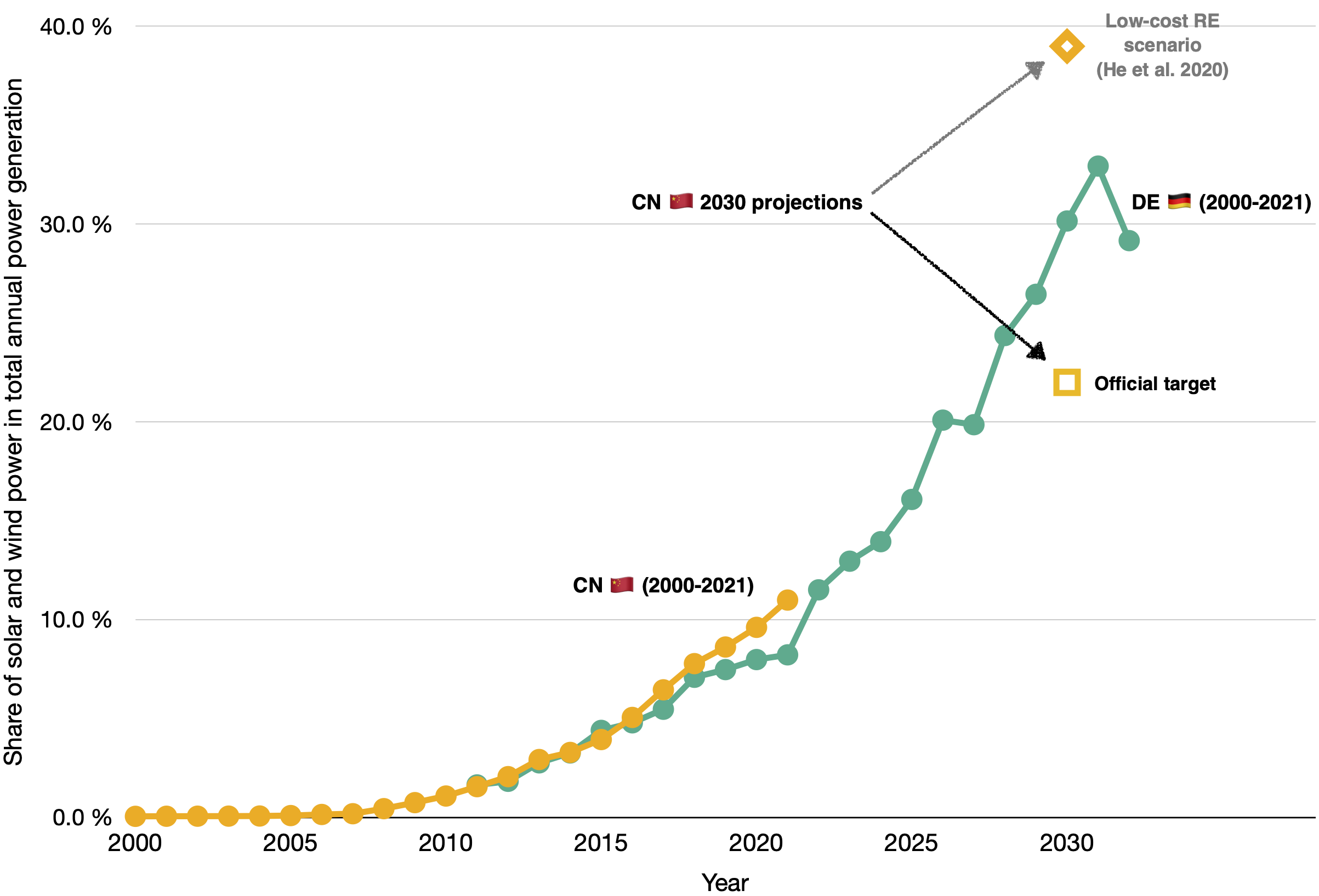
Renewables growth in China and normalising normalisation
Renewable power capacity additions in China often attract widespread attention for their sheer magnitude. But how useful are these raw numbers without considering the size of the country? Using installed capacity per capita and renewables’ share of national electricity production as illustrative examples, I make a case for normalising data when making inter-country comparisons. In addition to offering richer insights into the pace and extent of energy transitions, such analyses allow for a more nuanced view of change, help contextualise progress and set more realistic expectations.

Feasibility of Germany’s newly proposed RES targets
The new German government aims to strengthen their RES targets to supply 80% of electricity by 2030. How challenging are they? What level of efforts is required to achieve them? I apply growth models and compare with other leading countries in developing renewables to discuss the feasibility of Germany achieving these targets.

Can we predict the future growth of renewables based on past trends?
The IEA’s latest World Energy Outlook refreshes sophisticated scenarios that project the future growth of solar PV. Here, I investigate if we can match their predictions by fitting an S-curve to historical growth data.

Global growth of wind needs to be double as fast as recent growth in Germany to meet IEA’s Net Zero by 2050
The IEA Net Zero 2050 Roadmap envisions adding 310 GW of onshore wind in 2030. This is the same as was added globally in the last five years. Has such a rate been ever achieved in any country?

Early history of wind power in Germany and the UK
Before its fast expansion in the 2000s, wind power in the UK developed slower than in Germany. Why did this lag occur? While many early studies argued that it was due to a wrong selection of policy instruments, more careful look suggest that other factors may have played a role.

Does wind power grow faster in Germany or the UK?
In 2001-2014, wind power in the UK followed exactly the same trajectory as wind power in Germany in 1994-2007. Both paths are accurately predicted by the technology diffusion theory and do not show differences that would require additional socio-political explanations. What does require explanation is why the exponential growth of wind power was triggered in Germany and not in the UK in the early- or mid-1990s.

Comparing energy transitions in Germany and Japan
Lorem ipsum dolor sit amet, consectetur adipiscing elit, sed do eiusmod tempor incididunt ut labore et dolore magna aliqua. At quis risus sed vulputate odio. Maecenas accumsan lacus vel facilisis volutpat.
Fukushima’s impact on energy in Japan should be viewed in a broader context
In response to our Comment in Nature (1), Cherp and Jewell write that Japan's ambition for renewables was not altered by the Fukushima disaster (2). Although the evidence they present is technically accurate and their point on the decreased role of nuclear is correct, we would like to bring a broader context to the readers’ attention.

Russian nuclear industry and wind power
According to an article in Kommersant, a Russian business daily, Rosatom, the Russian state-owned corporation specialising in manufacturing of nuclear equipment and construction of nuclear plants is on the way to dominate Russian wind power market.

Renewables targeted before Fukushima
In a recent letter to Nature we argue that Japan had become a world's leader in solar energy long before Fukushima. This is both good and bad news for low-carbon energy transitions. On the one hand, there is no need to wait for a nuclear disaster to develop renewable electricity. On the other hand, solar and wind energy will not magically emerge after an earthquake and a tsunami strike a nuclear power plant.